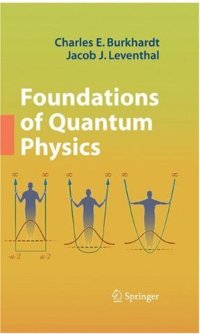
Ebook: Foundations of quantum physics
- Genre: Physics
- Tags: Quantum Physics, Quantum Computing Information and Physics, Mechanics, Elementary Particles Quantum Field Theory
- Year: 2008
- Publisher: Springer-Verlag New York
- Edition: 1
- Language: English
- pdf
Intended to be used as a textbook for an introductory course in quantum mechanics at the undergraduate level, Foundations of Quantum Physics is also meant to be retained by the student for later use as a reference. The presentation begins with the solution of some basic quantum mechanical problems. The emphasis is on those features of the solutions that are unique to quantum physics. It is only after these aspects of quantum physics are thoroughly discussed that the mathematical formalism of quantum mechanics is presented and related to the previous chapters. Throughout the book, the emphasis is on understanding the concepts and relating them to known phenomena.
Because the book is intended to serve as a reference long after it has been used as a textbook, it contains more material than an instructor can likely cover in a two semester course. In keeping with this theme, there are topics included, not necessarily more advanced topics, that are not normally covered in introductory textbooks.
Charles E. Burkhardt and Jacob J. Leventhal are authors of Topics in Atomic Physics (Springer 2005). Foundations of Quantum Physics will serve nicely as a prequel to the Topics book.
Our book is meant to be a text for a first undergraduate course in quantum physics. Both of us have taught this course numerous times and have used several different texts, some of them excellent. Obviously, though, there are changes we would make and that is the reason we are writing this book.
Two of the most widely used books for this course are the excellent texts by Griffiths (Prentice-Hall) and Gasiorowicz (Wiley), both of which we have used. Another, which neither of us has used but both of us are familiar with, is by Liboff (Addison-Wesley). While we find much to like about these books, there are matters of style, order of presentation and included subject matter that we obviously prefer. We do not wish our comments to be taken as criticism of other books but merely as a statement of our own preferences and the reasons that we believe our style and method can be helpful to students and instructors.
We wish to avoid a modern trend in textbooks that is to condense and compress these texts into ever smaller and smaller size. We are not sure whether this trend is to lower the cost of the book or to make the book seem less formidable to the student, but we believe that a textbook should be more than a one or two semester acquaintance. This is especially true for a course such as quantum mechanics which is likely taken by physics majors who will use the subject for the rest of their careers. We therefore believe that a textbook can (and should) contain material that an instructor will choose to omit. In keeping with this theme, there are topics included that are not normally covered in introductory textbooks, not necessarily too advanced, but not usually covered. Perhaps in years to come this student, now working as a physicist, is interested in the subject that was skipped during the course. He/she knows where to find the material in a book that is quite familiar to him/her. Both of us have many such books in our personal libraries. It seems as if modern physics texts are not built to be long term reference books. This is just our observation and we would like our book to have “staying power” and be long term companions.